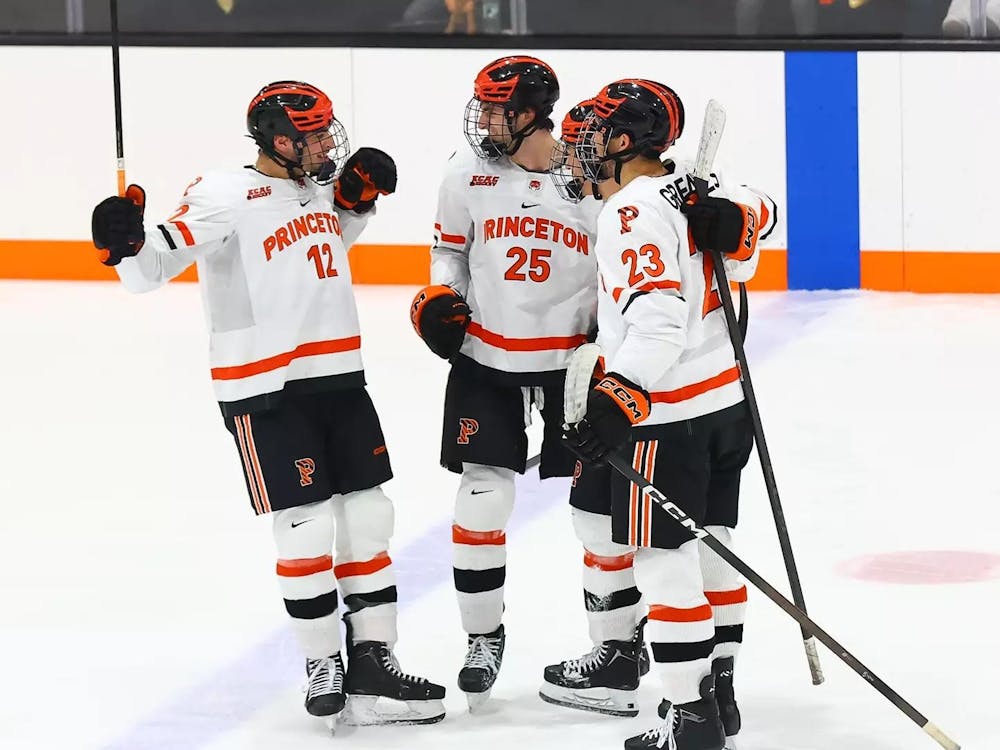Her list of accomplishments is almost too long. She owns two team national championships and two individual national championships. She has been a first team All-American all three years she has been at Princeton.
She has also been the Ivy League Player of the Year for the past three years. As a freshman, she became the first player in conference history to win the Ivy Rookie of the Year and Player of the Year awards in the same season.
Julia Beaver is one of those rare athletic talents — the type of athlete that not only shines above her teammates and opponents, but has also come to dominate her entire sport.
The junior No. 1 on the women's squash team added yet another accolade Monday night at the Daily Princetonian's year-end banquet, when she was named Female Athlete of the Year.
Squash is an individual sport, so Beaver can only win her own match when the Tigers take the court as a team. But her attitude and her work ethic inspire everyone around her.
"Julia walked on this team as a leader as a freshman," head coach Gail Ramsay says. "Her success rubs off on everyone — her play pulls everyone up."
And no matter the school, no matter the opponent, the Tigers can always count on that success. Beaver is undefeated in dual match play during her Princeton career. It is for this consistent domination that she was honored.

Her competition this year was extremely tough — she faced many new faces at the No. 1 spot. Beaver also battled a different type of opponent — a nagging toe injury that held her back for a few weeks early in the season.
"This was one of her most challenging seasons," Ramsay says. "She did a tremendous job dealing with the distractions and injuries and problems to play with such success and intensity."
From a team standpoint, the season was also much more difficult for Beaver than her previous two years. In 1998 and 1999, the Tigers were national champions, but this season, they fell just short of a three-peat.
Princeton's only losses of the season came against Penn — in a dual match Jan. 26 and in the Howe Cup finals for the national championship Feb. 20. Both losses were by a 5-4 margin.

That final match saw a change in Penn's lineup, in which the Quakers' No. 1 and No. 2 players had been reversed from the previous matchup with Princeton. It appeared almost as if Penn was conceding the victory at No. 1 to the seemingly unbeatable Beaver in order to pursue a more favorable matchup at No. 2.
Beaver, however, has remained modest, offering an alternative explanation.
"I don't like to make excuses. It is the coach's discretion as to who plays at what spot," Beaver says. "I think it came from experience — they put a senior at No. 1 and a freshman at No. 2."
Though a team title eluded Princeton, Beaver herself bounced back for her biggest challenge of the year — the 2000 WISRA Individual Championships.
In the semifinals, Beaver was matched up with Olga Puidgemont-Sola of Cornell. Down 2-0, Beaver faced a match ball in the third game, meaning that her opponent needed only one more point to defeat her in both the game and match.
Beaver came back to take that game and then the next two, winning the match and moving on to the finals.
"Her mental game is amazing," junior Meredeth Quick says. "She tells herself that she's not going to lose — and she doesn't."
In the finals, her opponent — Yale's Laura Keating — also took Beaver to five games. Keating was an opponent that Beaver had never seen before, which worried the Tiger star.
"I went onto the court thinking she was better than I was," Beaver says. "I pulled myself together and played my best squash."
Her fear turned out to be unnecessary as Beaver captured a second straight individual national championship. Although she faced an opponent whom she had never seen, Beaver proved she can defeat just about anyone that is thrown at her, under any circumstances.
At U.S. Women's Nationals March 16-19 — an event open to both collegiate and professional players — Beaver advanced farther than any other amateur, finishing second in the entire tournament. She defeated Shabana Kahn, who was seeded No. 2 in the tournament and ranked No. 24 in the world, in the semifinals. She ultimately lost to the tournament's top seed — Latasha Kahn, who was ranked No. 18 in the world — in the finals.
"I don't usually like to lose, but that match was very encouraging," Beaver says. "I lost to the No. 1 U.S player, and it was a very close match. I felt like I was right in there with her. With a little extra training, I feel like it might have been different."
After graduating from Princeton, Beaver will take a few years off to train full-time. She plans to play on the professional circuit before going to medical school.
"It's going to be one of her biggest challenges, but I wouldn't bet against her," Ramsay says. "I haven't seen her fail yet."
However, Beaver still has one more year to dominate the collegiate scene. And based on her previous achievements, she is a good bet to do just that.







